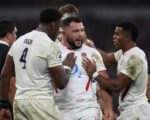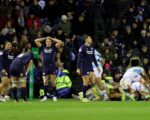One might have forgiven Steve Borthwick a moment to boast or brag after only a ninth English win over New Zealand in history, but the former lock is as phlegmatic a character as you will find. Given three separate chances to send a message to those who criticised him last November, when England were in the midst of a long losing run to Tier One nations, the head coach declined three times. “I got criticised?” he asked captain Maro Itoje next to him, with a knowing, subtle smile. “I didn’t see it,” Itoje replied, picking up quickly on his head coach’s bit.
Clearly, of course, both had seen plenty of the coverage when England had come under huge scrutiny. The very fact that it was Itoje, rather than Jamie George, sat alongside Borthwick showed that he recognised change was needed, a switch of skipper made ahead of this year’s Six Nations in an attempt to instigate improvement. But just as he did not get too low amid the tough times of 2024, Borthwick was not about to rub England’s success in the faces of those who questioned their direction 12 months ago.
“I think the group’s had a huge amount of belief for a long period of time,” Borthwick demurred when it was put to him that a statement win over the All Blacks would swell his side’s confidence. “There have been big performances from this team over the last period.
“The big thing that pleased me is they want to improve. The team will never get too high, never get too low – it will just continue to work to improve. It is an incredible memory they just created. And they’ll celebrate it together and enjoy it together, and the more moments we have as a team together, the more we have experiences as reference points for future games.
“I know you keep referring back to 12 months ago, but this team was just coming together. It was a new team. It was changing since that last World Cup. Then each of those reference points in games where tight margins have gone against us, it is a learning experience to make sure it does not get repeated. The guys just have utter belief now. If we go down on the scoreboard, I have utter belief in the senior guys that their team becomes composed, resilient and find a way through it.”
There are still two years to go until the 2027 Rugby World Cup but, increasingly, England are tracking to be a top contender. A win over New Zealand has not always proved a real launchpad for sides of the past, yet Saturday felt the sort of assured showing of a team increasingly comfortable with their status as a top team. The messaging in the week, led by George, was not one of scrapping like underdogs but matching bite and bark in a performance of alphas – an attitude shift underlined by a response to the haka intentionally spearheaded by the hooker and Henry Pollock, England’s eldest and youngest players.
“We wanted to replicate 2019 [in the World Cup semi-final] because we hadn’t done it here, which is something that I thought was pretty cool,” George explained. “A response like that is great, but then backing up with the performance that we backed up with was the most important thing.”
A vintage All Blacks side this is clearly not, particularly when Beauden Barrett is carrying a knock and his younger brother Jordie is out, too. They may feel that Codie Taylor’s ruck misdemeanour was harshly looked upon – occurring, as it did, in an innocuous area and conceding their first penalty of the game, but the sin-binning again helped the hosts seize control of the third quarter, which has become New Zealand’s problem period.
One must consider also that England were absent a few players, too. George Martin, Ben Curry, George Furbank, Ollie Chessum and Tommy Freeman might all have made the matchday 23 if not for injury; if Freeman’s development in the centres has been put on hold by his hamstring issue, the performance of Ollie Lawrence served as a reminder of what he can do at No 13. A clearer and clearer identity has emerged – England again thrived in transition, particularly out of the contestable kicking game that is ever more key, with Marcus Smith sparky after an early introduction at fly-half.
England have been privately frustrated with suggestions that they are merely aping South Africa’s strategy, but there are worse ideas than tracing the template of the double back-to-back world champions. Borthwick’s side suddenly look a nightmare to play against – nine dominant tackles to their opponents’ three underlined their in-your-face intensity, further characterised by Pollock, Ellis Genge and the rest of the bench after each big moment.
A scrum penalty won against the head on the hour mark vindicated the loading of the replacements with British and Irish Lions – England, and Genge and Pollock particularly, celebrated as if they had won the World Cup. It stood in stark contrast to the stolid boss; a clip of England’s coaches’ box in the aftermath of Fraser Dingwall’s try showed Borthwick with head buried in laptop as those around him leapt to their feet.
“Our scrum’s in a good spot,” George said. “We’re very proud of it. We know the importance of it. In years gone by, it has potentially let us down. So we have got our heads down, worked really hard.”
The same could not be said on Saturday of England’s lineout, which wobbled mightily in the absence of Chessum – who will also miss their November finale against Argentina. It is a trade-off that Borthwick feels is worthwhile to ensure he can best utilise his clan of cackling back row hyenas.
Argentina will provide another good gauge of where England are, with their ability to quickly move the ball in transition making them a real threat. An eight-day turnaround may be useful for Borthwick and his squad to avoid any kind of hangover from an All Blacks win readily celebrated; the physical, mental and emotional toll of back-to-back-to-back Tests may see a freshening up of the side in certain places. Clearly, a defeat would puncture the optimism surrounding England, but the true test of the autumn has been passed with flying colours.









